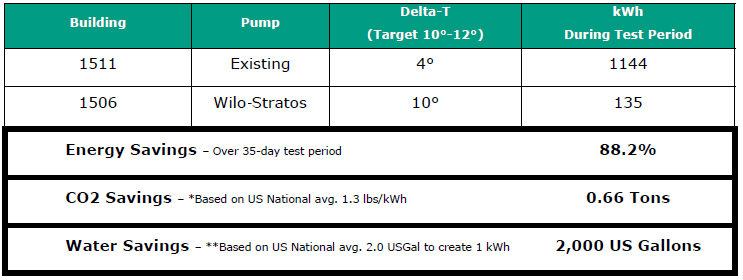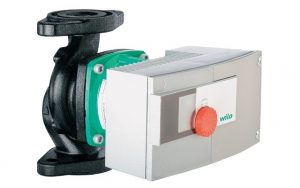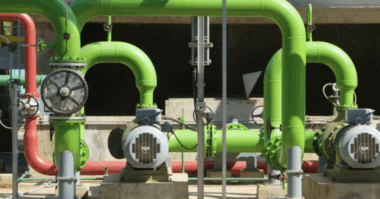In 2014, the commander of public works at a large U.S. military base began investigating potential energy savings initiatives related to building operations. While pumps are often overlooked as major consumers of a building’s energy, the commander had previous exposure to Wilo pumps and their benefits while stationed in Germany and wanted to evaluate different pumping solutions to determine if there were any opportunities to reduce energy usage and building operation costs.
Working with Wilo, the commander ran a pump efficiency trial over a 35-day test period with two identical barracks selected as the sites for the experiment. In one building, Wilo-Stratos high-efficiency circulator pumps were installed, while the other building maintained the existing pumping equipment as the control. In both cases, the pumps transported chilled water from the central chiller plant on base to the barracks for cooling purposes.

(Left) The existing 3HP Constant Speed End Suction Pump operating in Barracks 1511 (Right) The Wilo-Stratos 3×3-40 High Efficiency Circulator installed in Barracks 1506
The 35-day pump performance test revealed the following:
- The barracks using the existing pumps were not being cooled effectively, because those pumps had been moving the water too fast to allow the chilled water to reach its cooling potential, as shown by the low Delta-T number in Figure 1 below.
- The difference in kilowatt hours (kWh) consumed was significant (see Figure 1 below). It became clear that the existing pumps were over-sized, ran constantly and consumed more energy than the Wilo-Stratos circulators.

Figure 1. Performance Results from 35-Day Pump Performance Comparison
The Wilo-Stratos high-efficiency circulators achieved 1,009 kWh energy savings in the experiment by using variable speed pumping, which allows the pump to operate efficiently based on demand.
Due to the significant difference in operation and energy consumption, the commander decided to replace nearly all of the pumps operating across the military base. Over the course of three years, Wilo worked with various military personnel to review the pumps installed base-wide and identify each application where they could replace their existing pumps with Wilo pumps. To date, approximately 600 pumps have been replaced with Wilo products, and the military base has seen significant reduction of their energy costs.
 Learn more about high efficiency pumps and circulators from Wilo USA.
Learn more about high efficiency pumps and circulators from Wilo USA.




